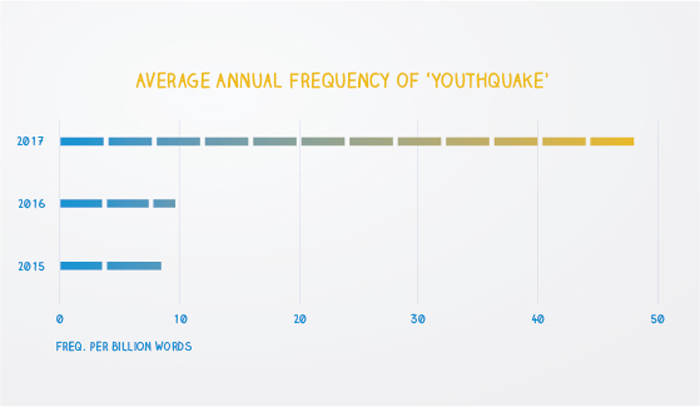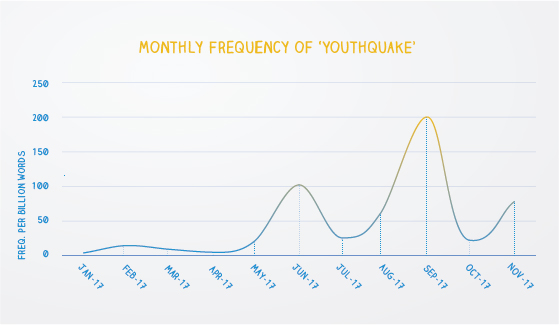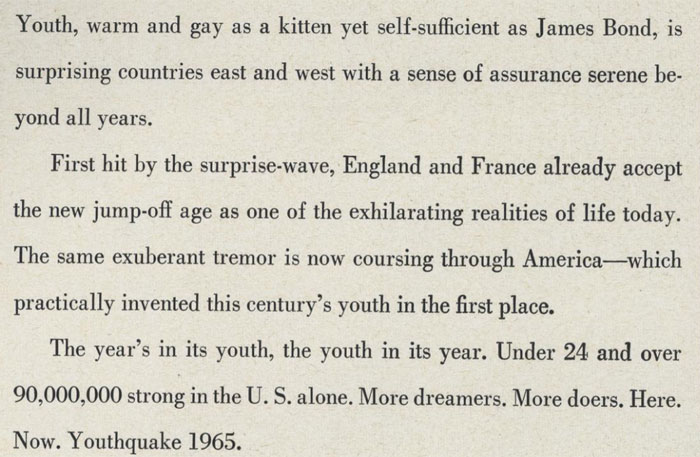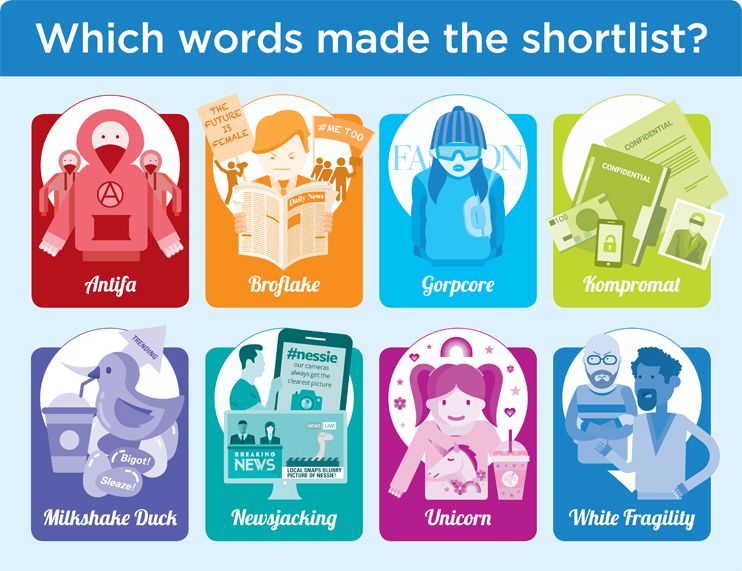Word of the Year 2017
Word of the Year 2017
As 2017 draws to a close, we turn to language to help us mark where we have been, how far we have come, and where we are heading.
One word has been judged as not only reflective of the ethos, mood, or preoccupations of this past year, but as having lasting potential as a word of cultural significance.
The Oxford Dictionaries Word of the Year 2017 is… youthquake.
The noun, youthquake, is defined as ‘a significant cultural, political, or social change arising from the actions or influence of young people’.
Why was ‘youthquake’ chosen?
The data collated by our editors shows a fivefold increase in usage of youthquake in 2017 compared to 2016, the word having first struck in a big way in June with the UK’s general election at its epicentre.

On 18 April, Prime Minister Theresa May, leader of the Conservatives, called a snap election triggering seven weeks of intense political campaigning. After the British public went to the polls on 8 June, headlines emerged of an unexpected insurgence of young voters.
'Youthquake' behind Labour election surge divides generations https://t.co/6OJ3opygHX
— The Guardian (@guardian) June 20, 2017
So despite higher engagement figures among the baby boomer generation and despite Labour ultimately ending up with fewer seats than the Conservatives in the House of Commons, many commentators declared that ‘It was the young wot “won” it for Jeremy Corbyn’, and dubbed their collective actions a ‘youthquake’.

It was in September that the second, and largest, spike in usage of youthquake was recorded for the year – and a youthquake wasn’t even required to deliver this data.
Thanks to the precedent established in the UK, in New Zealand use of youthquake to discuss young people’s engagement in politics was rapidly picked up by politicians and the press alike during the country’s general election. The word enjoyed increased and sustained usage both prior to and after the polling, setting youthquake firmly on its way to become a fixture of political discourse.
Political Roundup: Is a 'youthquake' looming, or not? https://t.co/xfEshe2dyS pic.twitter.com/OQKAK4W5z3
— nzherald (@nzherald) September 19, 2017
According to our corpus data, usage of Antifa was at a high in August this year in discussions of the demonstrations against the white nationalist ‘Unite the Right’ rally in Charlottesville, Virginia, both in self-identification and as a pejorative descriptor.
While unquestionably associated with 2017, the term Antifa actually has a much longer historical arc. Antifa is a German loanword, a borrowed abbreviation of Antifaschistische Aktion (Anti-fascist Action), the militant anti-fascist network established in Germany in the years preceding the Second World War.
Initially surfacing in the punk-rock scene of the 1970s, today’s self-described Antifa groups share no direct organizational lineage with the early-twentieth-century movement, but have adopted some of its tactics and stylings – such as the all-black accoutrement of the ‘Black Bloc’ as first seen in the Netherlands – in a bid to link and legitimize its political activities.
When was ‘youthquake’ coined?
In 1965, emerging from a post-war period of tumultuous change, Diana Vreeland, editor-in-chief of Vogue, declared the year of the youthquake.
In an editorial in the Vogue US January edition that year, she wrote: ‘The year’s in its youth, the youth in its year. […] More dreamers. More doers. Here. Now. Youthquake 1965.’

Vreeland coined youthquake – based on the pattern of ‘earthquake’ – to describe the youth-led fashion and music movement of the swinging sixties, which saw baby boomers reject the traditional values of their parents.
As in 2017, the UK was at the heart of the youthquake, with ‘the London Look’ of boutique street-style individualism taking the high fashion houses of Paris, Milan, and New York by storm to inform a new mass-produced, ready-to-wear fashion directive worldwide.
A word we can all rally behind
Sometimes a Word of the Year is selected in recognition of its arrival, but other times it is a word that has been knocking at the proverbial door and waiting to be ushered in.
Our choice of language illuminates our preoccupations, and as this tumultuous year draws to a close, our President of Dictionaries Casper Grathwohl believes that it is time for a word we can root for and collectively empower as Word of the Year:
‘Youthquake may not seem like the most obvious choice for Word of the Year, and it’s true that it’s yet to land firmly on American soil, but strong evidence in the UK calls it out as a word on the move.
‘We chose youthquake based on its evidence and linguistic interest. But most importantly for me, at a time when our language is reflecting our deepening unrest and exhausted nerves, it is a rare political word that sounds a hopeful note.
Sometimes you pick a word as the Word of the Year because you recognize that it has arrived, but other times you pick one that is knocking at the door and you want to help usher in…. I think this past year calls for a word we can all rally behind.’
The shortlist
Out of the plethora of words suggested and discussed, only nine made it to the final shortlist, before youthquake was crowned Word of the Year 2017.
Why did these eight words merit our Word of the Year 2017 shortlist?
Additional references: Jožef Stefan Institute Timestamped Web Corpus, and BYU NOW Corpus

